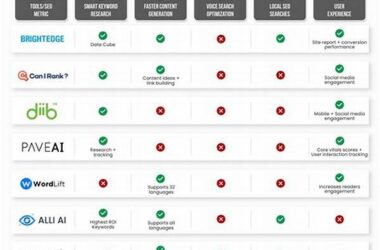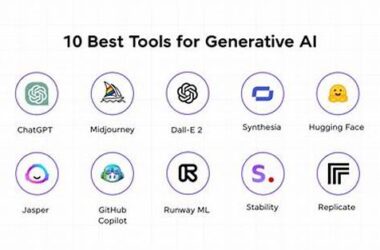In the whirlwind of modern work life, where responsibilities stack up like an endless tower of Jenga blocks, maintaining clarity and organization seems like a task suited only for superheroes. Between project management, team collaboration, and the daily grind of routine tasks, professionals often find themselves on the brink of burnout. Enter AI task managers—a transformative technology that revolutionizes organizational efficiency and productivity. Imagine having a personal assistant that never sleeps and predicts your needs before you even have them. AI task managers do precisely that, acting as both the conductor of your work orchestra and the guardian against chaos. This sophisticated technology is not just about saving time; it’s about bringing order to the chaos, ensuring you focus on what truly matters. In this era of rapidly advancing technology, let’s delve into how AI task managers help organize busy work and why they’re becoming an indispensable tool in the professional landscape.
Read More : Ai Tools Face Swap
The first significant advantage AI task managers offer is their ability to prioritize tasks intelligently. They analyze the deadlines, workload, and even your productivity patterns to suggest the most efficient order for tackling your to-do list. This isn’t just a robotic prioritization process; it’s a dynamic strategy that adapts to the unpredictable nature of work life. The second cornerstone of AI task managers is automation. By taking over repetitive tasks, AI frees up valuable time and mental energy. Imagine all the mundane tasks that currently eat into your day being automatically handled, from scheduling meetings to sorting emails. Finally, AI task managers provide detailed insights and analytics on your work habits. This not only helps improve personal efficiency but also allows teams to coordinate better and achieve their goals collectively.
The Core Benefits of AI Task Managers
One of the most compelling reasons professionals are turning to AI task managers is their unparalleled organizational capabilities. When faced with busy work, many find their efforts diluted across tasks that yield little strategic value. AI task managers streamline these processes, promising a strategic advantage that makes every action count. The core benefit of using these smart tools lies in their ability to reduce cognitive load. By handling the heavy lifting in terms of prioritization and task management, AI task managers free the human mind to engage in high-level, strategic thinking. This results in not only increased productivity but also enhanced satisfaction as work becomes more meaningful and less about ticking boxes.
Bringing Order to Chaos: AI’s Role in Task Management
AI task managers act as a beacon of organizational excellence in the stormy seas of professional life. They’re like that friend who finds exactly what you’re looking for while you’re still saying, “I really need to find…” Using machine learning algorithms, they predict not only what tasks are pending but also how you might prioritize them based on past behavior and future demands. These insights aren’t just data points; they transform into strategic advantages that keep projects moving seamlessly and efficiently.
In a world that demands more from us now than ever, AI task managers are emerging as the silent yet powerful partners in the workplace. Companies leveraging these tools witness not only an increase in productivity but a profound shift in workplace culture—enabling teams to feel more in control, motivated, and effective. With such compelling reasons to adopt AI task tools, it is evident how AI task managers help organize busy work, making the seemingly unmanageable, manageable.
—
In the modern business world, rapid technological advancements have fostered a dynamic yet demanding work environment. Here, the relevance of AI task managers is becoming more pronounced as individuals and organizations strive to do more with less. AI task managers, through their intelligent systems, have become saviors for those who grapple with the multifaceted demands of a busy workload. The symbiosis of AI with task management is more than a trendy adoption; it’s a strategic response to the complexities of modern workflows.
The beauty of AI task managers lies in their ability to adapt and learn from your work habits. Utilizing sophisticated algorithms, these digital aides understand your priorities, workload, and efficiency patterns to optimize task management. They not only schedule meetings but remind you of deadlines and even suggest breaks to enhance focus—making them almost like a second brain for your professional tasks. This efficiency is why tech giants and startups alike are embracing AI-driven solutions to streamline operations.
Moreover, AI task managers offer insights that were once labor-intensive and hard to come by. Through detailed analytics, they provide visibility over how time is spent and suggest improvements, helping employees and managers make smarter decisions about resource allocation. The inevitable result is not just operational efficiency but also strategic growth. When work becomes streamlined, the quality of output increases, creating an upward spiral of productivity and satisfaction.
The heightened efficiency offered by AI task managers is reflected in transformative improvements in how work is approached. Adopting such innovative tools isn’t just about staying ahead in the competitive race but is a necessary evolution towards smarter working. Embracing technology isn’t just about aiding current workflows—it’s about fundamentally transforming them to achieve new heights of professional success. It becomes clear that knowing how AI task managers help organize busy work is crucial for individuals aiming to thrive in today’s modern work environment.
Unpacking AI’s Organizational Magic
Behind the seamless operation of AI task managers lies an intricate system powered by machine learning and comprehensive algorithms. These digital wizards go beyond simple automation and enter the realm of predictive analytics. Imagine entering your office, and your AI task manager has already prioritized your tasks for the day based on deadlines, meetings, and past behaviors. That’s the power of AI task managers, an efficiency that’s nothing short of magical. With AI task managers, your workday begins not with planning what to tackle first, but with executing it seamlessly.
The Everyday Impact on Workflow
For teams and individuals alike, the impact of an AI-assisted workday is profoundly positive. Through automated workflows, mundane and repetitive tasks are handled without human intervention, thereby slashing time wastage and allowing more space for creative and strategic pursuits. The AI task manager becomes your personal assistant, ensuring not only that deadlines are met but that quality is never compromised. It’s this balancing act that underscores how AI task managers help organize busy work for people on a global scale.
—
Understanding the objectives behind AI task managers offers insight into their increasing popularity. Companies across the globe are swiftly adopting these technologies, recognizing the myriad ways they transform a bustling work environment into a haven of productivity and focus. Herein, we explore a few pivotal objectives that highlight the crucial role these tools play in modern work settings.
The implementation of AI task managers supports organizations in pursuing these objectives with vigor and determination. A primary benefit associated with these objectives is the elimination of the mundane. Employees no longer grapple with repetitive tasks that detract from their core responsibilities. Instead, they enjoy a workflow where their skills can shine through on meaningful tasks.
Moreover, the ability to dynamically prioritize tasks ensures that work remains agile and responsive to shifting demands. This adaptability cultivates a responsive work culture where individuals feel empowered and less burdened by clutter, leading to enriched job satisfaction. Lastly, AI task managers provide valuable data analysis that informs performance assessments and strategic planning, contributing to an overall smarter and more informed work environment.
While the objectives of AI task managers might stem from the need to optimize work, the true essence lies in the elevation of the workplace experience. Companies that leverage AI enjoy a distinct competitive edge, seeing the fruits of their investment not just in efficiency, but in a happier and more fulfilled workforce. As the digital transformation continues, understanding how AI task managers help organize busy work becomes essential in maintaining relevance and thriving in an increasingly challenging business landscape.
AI’s Transformative Power in Managing Work
The advantages AI task managers bring to the table are not merely theoretical. Businesses that have adopted these tools often report tangible benefits, such as faster project completion times, better alignment of organizational goals, and a healthier work-life balance for employees. These are testament to the system’s ability to integrate seamlessly into existing workflows, proving that when it comes to how AI task managers help organize busy work, the results speak volumes.
Enhancing Workplace Dynamics with AI
The role of AI task managers goes beyond individual productivity. By ensuring teams work synergistically, these managers boost collective productivity, improve team dynamics, and cultivate a work environment where innovation is the order of the day. Indeed, the transformation is not just at the individual level but permeates the fabric of an entire organization, heralding a new dawn for corporate workflows.
—
In today’s fast-paced work environment, AI task managers are a game-changer, offering a wealth of benefits that address the major challenges faced by professionals. These advanced tools not only boost individual productivity but also enhance team efficiency and strategic planning. Below, we delve into some impactful ways AI task managers are reshaping the workplace landscape.
AI task managers not only streamline workflows but also empower employees by providing them with the tools they need to excel in a modern work environment. By focusing on strategic tasks, professionals can channel their creativity, driving organizational success and personal growth. AI task managers also prioritize tasks in real-time based on urgency and importance, allowing teams to adapt swiftly to changing priorities without losing momentum.
Moreover, by promoting better communication and collaboration, AI fosters a more harmonious and productive workplace. Employees can effortlessly track project progress and share updates, reducing silos and promoting synergy. This not only enhances work output but also boosts morale, as team members feel more connected and in tune with their collective goals.
In summary, AI task managers are more than mere productivity tools—their strategic impact on workflows leads to comprehensive improvements across the board. Organizations that integrate these systems find themselves more agile, efficient, and competitive. Understanding how AI task managers help organize busy work provides crucial insights for any business looking to thrive in today’s fast-paced, digital-first landscape.
Revolutionizing Task Management with AI
The transformative power of AI task managers is undeniable. By redefining task management processes, these tools pave the way for smarter, more efficient work environments. With the ability to learn and adapt, AI task managers not only alleviate the burden of busy work but also empower employees to work smarter, not harder. In doing so, they become indispensable allies in navigating the complexities of modern-day work, ensuring sustained organizational success.
Scaling New Heights in Productivity
The implementation of AI task managers marks a pivotal moment in modern business strategy. By embracing these innovative tools, organizations are not only scaling new heights in productivity but also fostering a culture of innovation and continuous improvement. As businesses unlock the full potential of AI task managers, they not only differentiate themselves in competitive markets but also achieve a transformative edge that fuels sustained growth and success.



